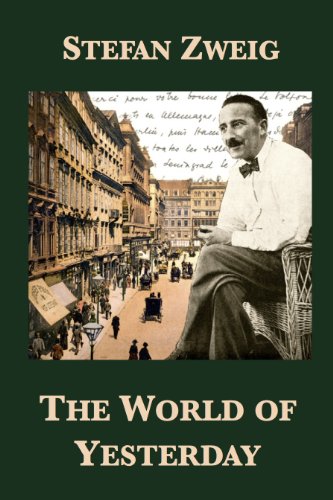An autobiography from a delicate, kind, ever dreaming visionary and literature man of old and new Europe.
For truly I have been detached, as rarely anyone has in the past, from all roots and from the very earth which nurtures them. I was born in 1881 in a great and mighty empire, in the monarchy of the Habsburgs. But do not look for it on the map; it has been swept away without trace. I grew up in Vienna, the two-thousand-year-old super-national metropolis, and was forced to leave it like a criminal before it was degraded to a German provincial city. My literary work, in the language in which I wrote it, was burned to ashes in the same land where my books made friends of millions of readers.
Then
I have to say the first part of the book was a bit boring for me. Zweig had a childhood in a world where political ideas were liberal but the living itself was still very conservative. Thus he went to the usual private high school, got bored, ventured into literature and made an early success of himself before even graduating from that hated gymnasium he talked about feverishly. (A side note, he says that until 1914, you could travel around the world without a passport and a visa, that's how peaceful those times were then!)
He then ventured into greater Europe and world and made a lot of friends from these literary circles. He identifies himself as a biographer and translator in his words (although he has a lot of important plays, novellas and short stories) and claims that his mission was for European people to learn more about poets and writers of other European nations. By working on this field, we can argue that he formed maybe one of the first ideas of European unity, at least among people of literature.
Now
Then things start to become interesting for the reader but unfortunate for the people of the world living at that time. Zweig paints a picture where the people practically lived in a European union, but the politicians were corrupt to see the unity and thus acted against it. He gets an archiving job for the Austrian army during the war and witnesses the horror of the war first hand by moving around frontiers and poverty and human misery it had caused directly.
What really touched me in this book starts hereafter. As a citizen of Turkey and living in the UK with a worker visa, I could identify a host of feelings and events that happened around Austria and Germany at that time with what's going on in Turkey for around 20 years now. The crazy inflation years, the loss of confidence in conventional politicians, demagogues and hate mongers rising to power, using a mythical concept of race (or religion in our case), vilifying a certain section of the public for everything that's bad is so familiar to me that it gave me the chills while reading. Foreseeing the rise of Nazis and their intentions to destroy the Jews in central Europe, Zweig flees to the UK where he never feels at home (he calls it the second ring of human dignity).
Future
Unfortunately the book ends at the start of the second World War and what's more unfortunate is this sublime human being lost the will to live at 1942. If only he could resist for three more years, who knows how much goodness he could leave more behind?
